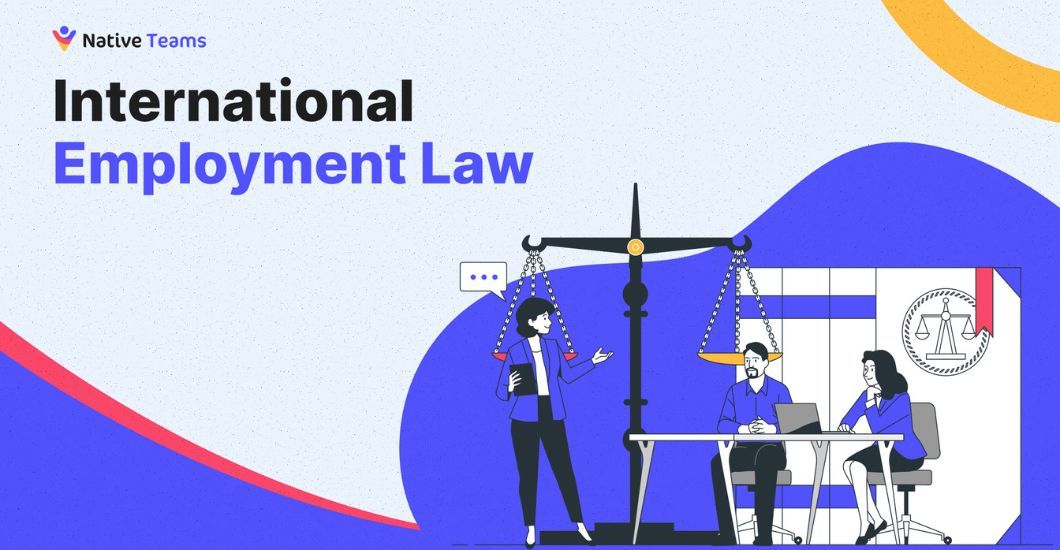International Employment Law
New trends, such as the rise of the gig economy, remote working, and modern digital technologies are allowing organisations to expand overseas much easier. However, in order to employ a workforce in foreign countries, it’s essential to understand and be compliant with international labour laws.
In this article, we cover everything about international employment law, including the applicable laws, labour standards, general principles, tax laws, and any difficulties you can encounter during the process.

What is international labour law?
The international labour law is the body of rules and regulations set by the International Labour Organisation, to regulate the rights and duties of employees, employers, labour unions, and governments involved in the workspace. International labour law includes all the laws that apply across countries, as well as comparisons between the laws of these countries.
What are the applicable laws for international employment
There are 3 types of laws included in international labour laws, as follows:
- Public international laws
- Private international laws
- Comparative laws
Public international laws are the rules and regulations between different countries, while private international laws are the rules and regulations between individuals and businesses that operate in different countries. Comparative laws include comparisons between the laws of different countries, and are not applicable in every case, depending on the country.
What difficulties can you have when hiring people abroad
Multicultural and diverse teams open up new opportunities and perspectives that can positively impact many aspects of an organisation’s operations. However, even though it’s beneficial, hiring across the border can be quite challenging. Here are some of the most common difficulties employers face when hiring people abroad:
- Laws and regulations – Different countries have different laws regarding employment. This is why employers need to get educated about international labour law or hire a PEO company to handle the legal part.
- Cultural differences – Cultural differences can challenge the coordination of international teams. To overcome this barrier, employers need to nurture an open work culture and simple communication.
- Different time zones – Operating in different time zones can hinder a team’s productivity. Employers can solve this issue with the help of different digital tools, flexible schedules, and clear communication.
What are international labour standards?
International labour standards are conventions and recommendations that protect employees’ rights, enhance job security, and improve workspace conditions. These standards are set by the International Labour Organisation throughout 189 conventions and treaties whose independent authorities need to ratify, while recommendations can be autonomous.
The most important international labour policies are included in the “Declaration of Fundamental Principles and Rights at Work”, and they include:
- Prohibition on child labour
- Prohibition on forced labour
- Prohibition on discrimination at work
- Free association and collective bargaining rights
Organisations that are operating within countries that signed the international labour standards and are not compliant with them, can be subject to significant measures and costs. On the other hand, organisations that are not affected by the standards are recommended to consider them so they can establish fair working conditions.
The set standards of European labour law across the European Union
European labour standards are the set of conventions and recommendations that apply to countries within the European Union. The European employment law includes the following standards:
- The right to a written statement or a contract of employment, regardless of the employment’s time nature
- The right to free movement across the countries in the European Union
- The right to a minimum of 4 weeks of annual leave
- Prohibition of discrimination in the workplace
- Minimum standards for health and safety at work
- Restrictions and limitations on redundancies
European labour standards don’t include any rights regarding employees’ minimum wages, since this area is independently regulated by the governments of the separate countries in the European Union.

How can you handle international tax laws
International tax laws refer to the taxation of organisations that operate across the border. Being compliant with tax laws is among the most important aspects of international labour law.
To be more specific, organisations that operate in more than one country are obligated to pay taxes to all the countries where they’re active. However, there are a couple of international conventions, such as some Double Taxation Agreements that allow allocating taxing rights, and therefore, preventing double taxation.
In order to stay compliant with international tax laws, international companies outsource tax management to professional PEO companies. A PEO company can help businesses optimise tax amounts, allowances, and deductions, and stay aligned with their financial obligations in specific countries.
General principles of labour law across countries
Domestic labour laws can differ between countries. However, some international sets of rules, such as international, or European labour laws and standards reach multiple countries at the same time. In this section, we’re explaining the general principles that must be followed to stay compliant with every country’s law.
Minimum wage
The minimum wage is the minimum amount an employer is required to pay employees for work activities over a certain period. Many countries worldwide have their own minimum wage laws. In order to stay compliant with labour laws, organisations must meet the minimum wage requirements of the specific country of operation.
Employee contracts
Many countries also impose employment contracts to provide protection to employees. The purpose of these contracts is to define the terms of employment, such as the job span, wage, working hours, holidays, and other obligations between the employer and the employee.
Employee benefits
Every employer is required to provide employees with benefits. Employee benefits include contributions to healthcare insurance, unemployment insurance, retirement plans, and others.
Payroll obligations
Employers in many countries are also obligated to submit payroll taxes. However, this only applies to the workforce that is employed in the specific organisation, not to independent contractors.
Employee termination
Employee termination practices vary from country to country. However, according to the general principles of labour law, the employment termination process should follow fair practises.
Why understanding labour laws is so important
With the rise of new trends and today’s business landscape, it’s easier than ever to expand across the border. However, in order to avoid penalties and unethical work environments, employers need to be compliant with international labour law.
The purpose of labour law is to provide protection to the workforce. Such laws regulate the relationship between employers and employees and empower the workforce to accomplish their rights such as minimum wages, decent working hours, safe work environment, and others.
Parties that are not complying with labour laws are subject to strict measures and penalties. Hence, labour laws are important for holding all the parties accountable for their actions, and promoting a fair environment for both employees and employers.

Conclusion
Hiring abroad can be difficult due to some factors such as cultural differences, different time zones and the law of the specific country. In order to stay compliant with the country’s laws and regulations, employers need to be familiar with international labour law.
International labour law is the set of rules and guidelines that regulate the relationship between employers who hire abroad and their employees. These laws and standards are created to protect the employees’ rights to a contract or a written statement, minimum wage, working hours, benefits, restrictions on redundancies, and others.
Employers need to understand and stay compliant with labour laws in order to create fair work environments and avoid strict measures against them.
EOR services provided by Native Teams can help you stay compliant with the latest GDPR and privacy laws around the world.
Keep Learning:
Labour Laws in India: A Guide for Employers and Employees
